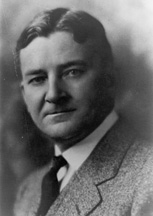Today we commemorate the passage of the Blaine Act in 1933. This brief piece of legislation began a year-long process that ended the more than twelve year debacle we know as Prohibition. During this period in the American cultural climate, alcohol - there were a few exceptions - could not be manufactured, sold, or transported in the United States.

Granted, overindulgence in alcohol was a particularly serious national issue by the Gilded Age (late 1870's to 1900) if not before. At the same time, I doubt few progressives from that era could have dreamed of the degree of lawlessness that engulfed American society as a result of their best intentions. Indeed, a year before the Blaine Act, John D. Rockefeller wrote this appraisal:
When Prohibition was introduced, I hoped that it would be widely supported by public opinion and the day would soon come when the evil effects of alcohol would be recognized. I have slowly and reluctantly come to believe that this has not been the result. Instead, drinking has generally increased; the speakeasy has replaced the saloon; a vast army of lawbreakers has appeared; many of our best citizens have openly ignored Prohibition; respect for the law has been greatly lessened; and crime has increased to a level never seen before.
I would suggest a toast this evening to The Honorable John J. Blaine, U.S. Senator from Wisconsin, who was responsible for not only writing the act bearing his name but also the 21st Amendment that officially repealed Prohibition. May his realistic response to such moral folly always be commemorated.

Oh that we should have such wisdom today!
Sources
Photos and Illustrations:
The New York Times, rarenewspapers.com
Blaine, public domain photo, bioguide.congress.cov
Text:
Rockefeller quote, "Twenty-first amendment to the United States Constitution," wikipedia.com

No comments:
Post a Comment